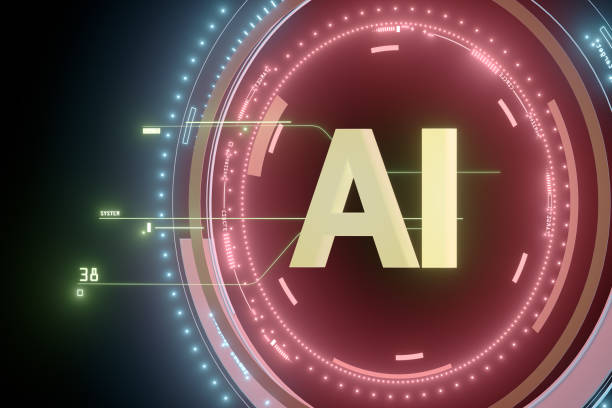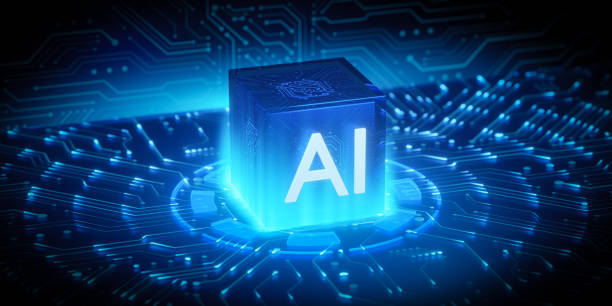What is Artificial Intelligence: Definition, History, and Basic Concepts

#Artificial_Intelligence (AI) is a branch of computer science that seeks to build machines capable of performing tasks that typically require human intelligence.
This definition includes learning, reasoning, problem-solving, natural language understanding, and machine vision.
The history of AI dates back to the 1950s, when scientists like Alan Turing and John McCarthy began exploring the possibility of building intelligent machines.
The basic concept of AI is to create systems that can analyze data, recognize patterns, and make decisions based on them.
AI strives to build machines that can think and learn like humans.
To better understand #Artificial_Intelligence, it is essential to become familiar with the following concepts:
–Machine Learning is a method that allows machines to learn from data without explicit programming.
–Neural Networks are models inspired by the structure of the human brain, used for pattern recognition and learning.
–Natural Language Processing enables machines to understand and generate human language.
AI is rapidly advancing, and its applications are expanding.
This technology has the potential to improve our lives in many areas.
Numerous educational and research resources are available to learn more about this field.
Wikipedia AI is a good starting point.
Are you tired of losing business opportunities due to not having a professional corporate website?
RasaWeb helps you with professional corporate website design:
✅ Build a powerful and reliable brand image
✅ Convert website visitors into loyal customers
⚡ Get a free consultation now!
Types of Artificial Intelligence: From Expert Systems to Deep Learning

Artificial intelligence can be categorized into various types based on its capabilities and implementation methods.
One classification method distinguishes between Narrow AI and General AI.
Narrow AI is designed to perform specific tasks, such as facial recognition or playing chess.
In contrast, General AI is capable of performing any intellectual task a human can do.
Expert systems were one of the earliest applications of AI.
These systems help solve complex problems by utilizing the knowledge of specialists in a specific domain.
Machine learning allows machines to learn from data and improve their performance.
Deep Learning is a subset of machine learning that uses deep neural networks to analyze data.
This method has been highly successful in areas such as image recognition and natural language processing.
Each of these methods has its own advantages and disadvantages and is chosen depending on the application.
Recent advancements in deep learning have opened new possibilities for the development of #Artificial_Intelligence.
For example, Generative Adversarial Networks (GANs) can produce realistic images and texts.
AI is becoming a powerful tool for solving various problems.
AI can help humans perform tasks and increase efficiency.
Artificial Intelligence (AI) continues to evolve, and we will see more of its applications in our daily lives.
Applications of Artificial Intelligence in Various Industries: Medicine, Automotive, Finance

The applications of artificial intelligence across various industries are extensive and diverse.
In the medical industry, AI is used for disease diagnosis, drug development, and providing personalized care.
For example, deep learning algorithms can analyze medical images such as X-rays and MRIs to detect abnormalities.
In the automotive industry, #Artificial_Intelligence is used for developing autonomous vehicles and driver-assistance systems.
Autonomous vehicles, using sensors and AI algorithms, perceive their surroundings and navigate without the need for a human driver.
In the financial industry, AI is used for fraud detection, risk management, and providing personalized financial services.
For example, machine learning algorithms can identify suspicious patterns in financial transactions and prevent fraud.
In addition to these industries, AI has numerous applications in other fields such as education, agriculture, retail, and manufacturing.
For example, in education, AI can be used to provide personalized learning and assess student performance.
In agriculture, AI can be used to optimize irrigation, manage pests, and increase productivity.
In retail, AI can be used to forecast demand, optimize pricing, and provide personalized recommendations to customers.
AI is reshaping various industries and has the potential to increase efficiency, innovation, and competitiveness.
Artificial Intelligence (AI) is rapidly becoming an essential technology for businesses.
| Industry | Application |
|---|---|
| Medicine | Disease diagnosis, drug development |
| Automotive | Autonomous vehicles, driver-assistance systems |
| Finance | Fraud detection, risk management |
Advantages and Disadvantages of Artificial Intelligence: Opportunities and Challenges

Artificial intelligence, like any other technology, has its own advantages and disadvantages.
Among its advantages are increased efficiency, reduced errors, improved decision-making, and fostering innovation.
AI can automate repetitive and tedious tasks, leading to increased productivity and reduced costs.
Furthermore, AI algorithms can analyze data with greater accuracy than humans and make better decisions.
However, AI also has drawbacks.
These disadvantages include high development and deployment costs, concerns about job displacement, ethical and security issues, and the potential for discrimination.
Developing AI systems requires significant investment and may lead to job losses in some industries.
Also, the use of #Artificial_Intelligence in decision-making can lead to discrimination, especially if the data used to train the algorithms contains bias.
To benefit from AI’s advantages and mitigate its drawbacks, it is necessary for policymakers, developers, and users to collaborate in this field.
Creating appropriate laws and regulations, training the workforce, and addressing ethical and security concerns are among the measures that can help ensure the responsible and sustainable use of AI.
AI has the potential to improve our lives in many areas.
But to realize this potential, we must simultaneously address its challenges and opportunities.
Are you losing business opportunities because of an outdated website? With RasaWeb, permanently solve the problem of not attracting potential customers through your website!
✅ Attract more high-quality leads
✅ Increase brand credibility in the eyes of customers
⚡ Get a free corporate website design consultation
The Future of Artificial Intelligence: Trends, Predictions, and Potential Impacts

The future of artificial intelligence looks very bright and promising.
With rapid advancements in machine learning, natural language processing, and computer vision, AI is expected to play a more significant role in our lives in the coming years.
Some important trends in this field include increased use of #Artificial_Intelligence across various industries, the development of more powerful and flexible AI systems, and the integration of AI with other technologies such as the Internet of Things (IoT) and blockchain.
AI is predicted to have profound impacts on our economy, society, and culture.
AI can help increase productivity, reduce costs, improve quality of life, and create new job opportunities.
However, AI can also create challenges, such as concerns about job displacement, ethical and security issues, and the potential for discrimination.
To benefit from AI’s advantages and mitigate its drawbacks, it is necessary for policymakers, developers, and users to collaborate in this field.
Creating appropriate laws and regulations, training the workforce, and addressing ethical and security concerns are among the measures that can help ensure the responsible and sustainable use of AI.
AI has the potential to make the world a better place.
But to realize this potential, we must simultaneously address its challenges and opportunities.
How Artificial Intelligence Can Change Our Daily Lives

Artificial Intelligence (AI) is already present in many aspects of our daily lives and is expected to play an even more significant role in the future.
Some applications of AI in daily life include: voice assistants like Siri and Alexa, which help us perform various tasks using voice commands.
Recommendation systems like Netflix and Amazon, which suggest movies, series, and products based on our tastes and interests.
Machine translation systems like Google Translate, which help us translate different languages.
Autonomous vehicles, which allow us to travel without the need for a human driver.
Facial recognition systems, used for unlocking smartphones and verifying identity in airports and other locations.
AI can improve our lives in many areas.
For example, AI can help us perform our tasks faster and easier, find the information we need readily, access better services, and make better decisions.
However, the use of AI can also create challenges.
For example, AI can lead to job displacement, create ethical and security issues, and have the potential to cause discrimination.
To benefit from AI’s advantages and mitigate its drawbacks, it is necessary to use this technology responsibly and consciously.
Ethical Issues in Artificial Intelligence: Discrimination, Privacy, and Accountability

The development and use of artificial intelligence come with important ethical issues that must be addressed.
One such issue is discrimination.
#Artificial_Intelligence algorithms may make discriminatory decisions based on their training data.
For example, a recruitment algorithm might inadvertently overlook female applicants.
To prevent discrimination, it is necessary to carefully review the training data of algorithms and design algorithms to be fair and unbiased.
Privacy is another crucial ethical issue in AI.
AI systems often require a large amount of personal data to function correctly.
This data may include sensitive information such as medical records, financial information, and location data.
To protect privacy, personal data must be securely stored and processed, and users must have full control over their data.
Accountability is also another important ethical issue in AI.
If an AI system causes harm, who will be responsible? Is the developer, the user, or the AI system itself responsible? To answer these questions, appropriate laws and regulations must be developed in this area.
AI has the potential to help us solve many problems.
But for the responsible and ethical use of this technology, we must pay attention to its ethical issues.
| Ethical Issue | Description |
|---|---|
| Discrimination | Discriminatory decisions based on training data |
| Privacy | Collection and use of personal data |
| Accountability | Determining responsibility in case of harm |
Skills Required for Working in the Field of Artificial Intelligence

Working in the field of artificial intelligence requires a combination of technical and non-technical skills.
Among the most important technical skills are: Programming: Programming languages like Python and R are essential for developing AI algorithms and models.
Mathematics: Knowledge of mathematics, especially linear algebra, calculus, and statistics, is crucial for understanding and developing AI algorithms.
Machine Learning: Familiarity with machine learning algorithms and model evaluation methods is essential.
Natural Language Processing: Familiarity with natural language processing techniques is essential for working with text data.
Computer Vision: Familiarity with computer vision techniques is essential for working with image data.
In addition to technical skills, non-technical skills are also essential for success in the field of #Artificial_Intelligence.
These skills include: Analytical Thinking: The ability to analyze complex problems and provide appropriate solutions is essential.
Problem-solving: The ability to solve new and innovative problems is essential.
Communication: The ability to communicate effectively with other team members and present results clearly and concisely is essential.
Teamwork: The ability to work effectively in a team is essential.
Continuous Learning: The field of AI is rapidly changing, so the ability to learn continuously and stay updated with the latest advancements is essential.
To acquire these skills, you can participate in online and in-person training courses, study relevant books and articles, and undertake practical projects.
With effort and perseverance, you can acquire the necessary skills to work in the field of artificial intelligence.
Is your e-commerce website ready to attract maximum customers and increase sales? RasaWeb transforms your online business with modern and efficient e-commerce website designs.
✅ Increase speed and improve SEO
✅ Excellent user experience on mobile and desktop⚡ Get a free e-commerce website design consultation from RasaWeb!
Artificial Intelligence Learning Resources: Books, Courses, and Useful Websites

Learning artificial intelligence requires access to appropriate and high-quality educational resources.
Fortunately, numerous resources are available for learning AI, including books, courses, and useful websites.
In terms of books, one can refer to “Artificial Intelligence: A Modern Approach” by Stuart Russell and Peter Norvig, “Machine Learning” by Tom Mitchell, and “Deep Learning” by Ian Goodfellow, Yoshua Bengio, and Aaron Courville.
These books are used as primary resources in many universities and training courses.
In terms of courses, one can refer to online courses offered by Coursera, edX, and Udacity.
These courses are taught by prominent university professors and industry experts and help you learn basic and advanced AI concepts.
In terms of websites, one can refer to arXiv, GitHub, and Stack Overflow.
arXiv is an online archive of scientific papers where you can find the latest research in the field of AI.
GitHub is a code hosting platform where you can find and contribute to open-source #Artificial_Intelligence projects.
Stack Overflow is a Q&A website where you can ask your AI questions and get answers from experts.
In addition to these resources, you can also use blogs, podcasts, and YouTube channels to learn AI.
The most important thing is to have a regular learning plan and continuously strive to increase your knowledge in this field.
Coursera is an excellent online learning platform for further learning.
Job Opportunities in Artificial Intelligence: Introduction to Key Roles and Labor Market Outlook

The field of Artificial Intelligence (AI) is rapidly growing and provides numerous job opportunities for specialists in this area.
Key roles in the #Artificial_Intelligence domain include: Data Scientist, responsible for collecting, analyzing, and interpreting data.
Machine Learning Engineer, responsible for developing and implementing machine learning algorithms.
AI Engineer, responsible for developing and implementing AI systems.
AI Researcher, responsible for conducting research in AI and developing new algorithms.
AI Architect, responsible for designing and implementing the necessary infrastructure for AI systems.
The job market outlook for AI professionals is very bright.
According to various reports, the demand for AI specialists is expected to increase significantly in the coming years.
This is due to the growing use of AI across different industries and the need for specialists who can develop and implement these systems.
To enter the field of AI, it is necessary to acquire the required technical and non-technical skills.
Participating in training courses, studying relevant books and articles, and undertaking practical projects can help you in this regard.
Additionally, building a network with other AI professionals can help you find suitable job opportunities.
LinkedIn Jobs is an excellent resource for finding jobs in this field.
Frequently Asked Questions
| Question | Answer |
|---|---|
| What is Artificial Intelligence? | It is the simulation of human intelligence in machines programmed to think like humans and imitate their actions. |
| What are the main branches of Artificial Intelligence? | They include machine learning, deep learning, natural language processing, computer vision, and robotics. |
| What is Machine Learning? | It is a branch of artificial intelligence that focuses on enabling systems to learn from data and identify patterns without explicit programming. |
| Give examples of Artificial Intelligence applications in our daily lives. | Voice assistants (such as Siri and Alexa), recommendation systems in Netflix and Amazon, self-driving cars, and facial recognition software. |
| What is Deep Learning? | It is a subset of machine learning that uses multi-layered (deep) artificial neural networks to process large amounts of data. |
| What is Natural Language Processing (NLP)? | It is a branch of artificial intelligence that focuses on enabling computers to understand, interpret, and generate human language. |
| What are some ethical concerns related to Artificial Intelligence? | They include data bias, privacy, job displacement, and accountability in case of errors. |
| What are the main benefits of Artificial Intelligence? | Increased efficiency, improved decision-making, automation of repetitive tasks, and discovery of complex patterns in data. |
| How is Artificial Intelligence used in healthcare? | In diagnosing diseases, drug discovery, analyzing medical images, and personalized patient care. |
| How do you see the future of Artificial Intelligence? | It is expected to continue evolving rapidly, impacting all aspects of human life, from industry to education and entertainment. |
And other advertising services from RasaWeb Advertising Agency:
- Smart Link Building: An innovative service to increase user engagement through intelligent data analysis.
- Smart Marketing Automation: A blend of creativity and technology for digital branding through intelligent data analysis.
- Smart Direct Marketing: Revolutionize campaign management with attractive UI design.
- Smart Website Development: A professional solution for user interaction focusing on SEO-driven content strategy.
- Smart Social Media: A creative platform to improve click-through rates with precise audience targeting.
And over hundreds of other services in internet advertising, advertising consultation, and organizational solutions
Internet Advertising | Advertising Strategy | Advertorials
Resources
AI on Zoomit
AI News on Digiato
AI on ISNA
AI Articles on IRNA
? Are you ready to transform your business in the digital world? RasaWeb Digital Marketing Agency, specializing in website design with modern user interface and comprehensive digital strategies, is your smart solution for growth and visibility.
📍 Tehran, Mirdamad Street, next to Bank Markazi, Southern Kazeroun Alley, Ramin Alley, P. 6




